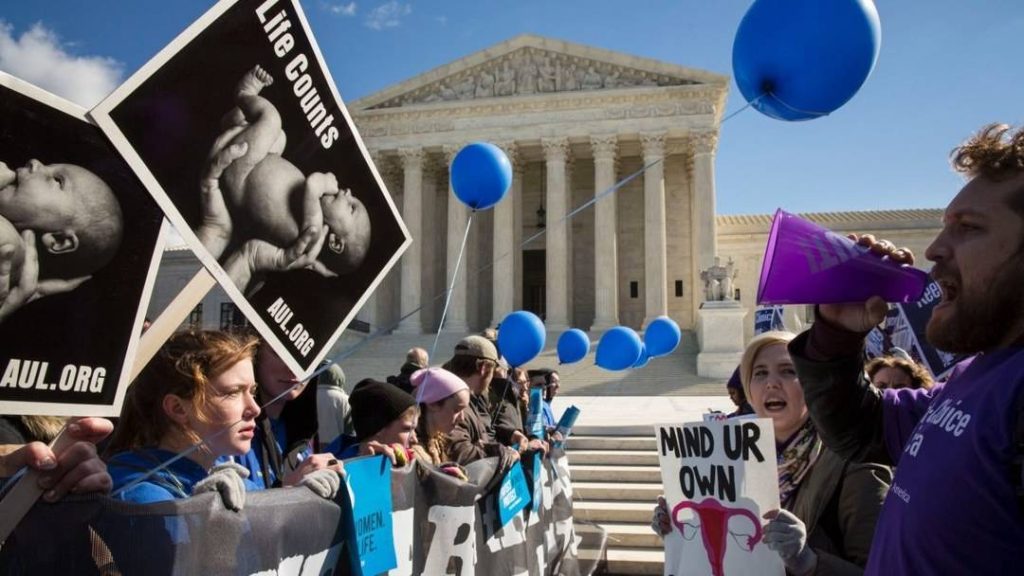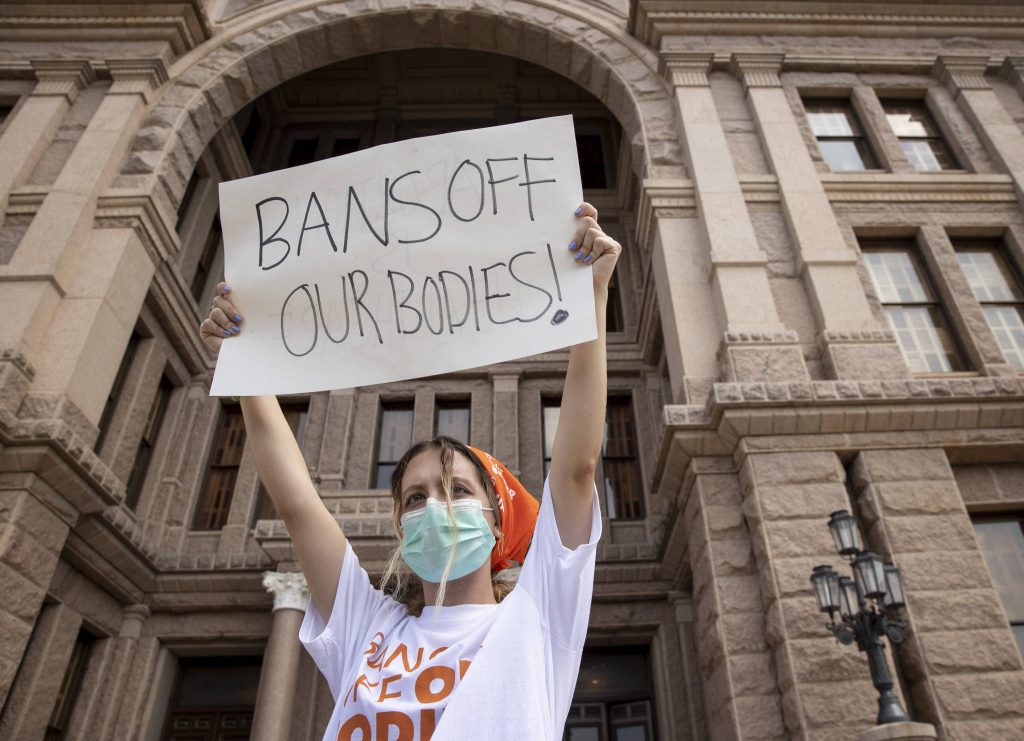In recent years, the issue of abortion has become increasingly contentious in the United States. With the landmark Supreme Court decision Roe v.
Wade effectively legalizing abortion in 1973, many states have since attempted to restrict access to the procedure.
However, in the past year and a half, Republican-controlled states have taken this effort to a new level by enacting outright bans on abortion.
In response to these bans, a Texas woman named Katie Cox recently sued her home state for the right to obtain an abortion.
While her request was ultimately denied by the Texas Supreme Court, Cox’s case highlights the growing resistance to these restrictive laws.
Indeed, many women have been forced to travel out of state in order to obtain abortions, underscoring the urgent need for a nationwide solution to this ongoing crisis.
The decision to seek an abortion in the case of the 31-year-old mother of two children is a complex and deeply personal matter.
After learning that the baby she was carrying had trisomy 18, a condition that significantly increased the likelihood of in utero or post-birth fatality, she and her husband faced an emotionally challenging situation.
Despite their desire for additional children, the couple found themselves grappling with the harsh reality of a pregnancy fraught with medical complications, including multiple emergency room visits.
As she reached the 20-week mark of her pregnancy, the decision to pursue legal action in the form of a lawsuit underscores the gravity of the circumstances they were navigating.
The ethical, emotional, and medical considerations surrounding this case are undoubtedly weighty, and they prompt a broader conversation about the complexities of reproductive rights and healthcare decision-making.
In recent years, the issue of abortion has been a contentious and highly debated topic in the state of Texas.
The case of a woman who sought an abortion due to the risk of uterine rupture and the potential endangerment of future pregnancies has brought this issue to the forefront once again.
In the court filings, the woman expressed her concerns about the risks associated with delivering the baby at full term by cesarean surgery, and how it could impact her health and the possibility of future pregnancies.
This case has shed light on the existing laws and restrictions surrounding abortion in Texas, and has sparked a renewed discussion about the rights of women and the ethical considerations surrounding reproductive health.
In Texas, there are multiple abortion bans in place, which significantly restrict a woman’s access to abortion services.
The state allows abortion only in cases where doctors determine it necessary to save the life of the pregnant woman.
Unlike at least three other states with bans on abortion at all stages of pregnancy, there is no exception in Texas for fatal fetal anomalies.

This lack of exception for fatal fetal anomalies has raised concerns among medical professionals and advocates for reproductive rights, as it limits the options available to women facing difficult and often heartbreaking decisions about their pregnancies.
Furthermore, the consequences for doctors convicted of providing illegal abortions in Texas are severe.
They can face up to 99 years in prison, hefty fines of $100,000, and the loss of their medical licenses.
These strict penalties have created a chilling effect within the medical community, leading to concerns about the potential impact on the doctor-patient relationship and the ability of physicians to provide appropriate care for their patients.
The case in question highlights the complexities and ethical dilemmas surrounding reproductive health and abortion rights.
It raises important questions about the autonomy of women to make decisions about their own bodies, the role of medical professionals in providing necessary care, and the impact of restrictive laws on access to reproductive healthcare services.
The woman’s plea for the right to make informed choices about her health and well-being has sparked a larger conversation about the need for compassionate and comprehensive reproductive healthcare policies in Texas.
As the debate surrounding abortion laws in Texas continues to unfold, it is crucial to consider the diverse perspectives and experiences of women, medical professionals, and advocates for reproductive rights.
It is essential to prioritize the well-being and autonomy of women, and to ensure that they have access to safe and legal reproductive healthcare services.
The case at hand serves as a reminder of the ongoing challenges and barriers that women face in exercising their reproductive rights, and the need for thoughtful and inclusive policies that uphold the dignity and rights of all individuals.
It is imperative for lawmakers, medical professionals, and advocates to work together to create a healthcare system that respects and supports the reproductive choices of women, and to address the complex and multifaceted issues surrounding abortion in a manner that prioritizes compassion, empathy, and respect for the autonomy of women.
The reason behind her decision to sue lies in the diagnosis of trisomy 18 that she received on November 28th.
This news came on the same day that the Texas Supreme Court was hearing arguments in a case brought forth by a group of physicians and women who had been denied abortions.
The state Supreme Court has yet to make a ruling on their challenge, which aims to clarify the exceptions in the state’s bans on abortions.
The plaintiffs argue that the bans are so vaguely worded that doctors are hesitant to provide abortions under almost any circumstance.
Learning about this case led her to seek out the lawyers representing those women. However, it’s important to note that her case is distinct from the others.
While the other plaintiffs claim that they were adversely affected by the state’s policies, Cox was specifically seeking the right to an immediate abortion.
Her decision to sue was driven by the urgent need for access to this medical procedure in light of her diagnosis.

In a recent case, Cox, like many others, was denied an abortion by doctors citing state law. However, an Austin-based judge, who is a Democrat, granted Cox permission to receive an abortion on Friday.
Despite this, the state attorney general cautioned that anyone providing an abortion could still face legal consequences.
The Texas Supreme Court then intervened, putting the lower court’s order on hold and ultimately ruling against Cox on Monday evening.
The high court determined that Cox’s pregnancy complications did not meet the criteria for a medical emergency under which abortions are allowed.
In an order that was not signed but was concurred by two of the justices, the court stated that “some difficulties in pregnancy, even serious ones, do not pose the heightened risks to the mother that the exception encompassed.”
This decision highlights the complex legal and ethical considerations surrounding abortion rights and access in the state of Texas.
It is interesting to note that even before the ruling was issued in the case of the Texas woman denied the right to an immediate abortion, her lawyers had already revealed that she had traveled out of state for the procedure.
While it is true that the ruling by a Texas court regarding a Texas law does not apply elsewhere, the fact that a pregnant woman from Kentucky has also sued her home state for the right to an immediate abortion is significant.
This woman, who filed under a pseudonym, is challenging the constitutionality of Kentucky’s ban, and despite the sad news that her embryo no longer had cardiac activity, her lawyers have stated that they will continue the case.

As Rachel Rebouché, an associate dean at Temple University Beasley School of Law in Philadelphia, has pointed out, it is not easy for pregnant women to bring these suits.
However, when they do, it emphasizes the importance of the issue at hand. It is crucial that the voices of pregnant women are heard and that their rights are protected.
It is not just a matter of legal technicalities, but of the very real and personal experiences of women who are facing difficult decisions about their bodies and their futures.
We must continue to support and advocate for these women, and ensure that their rights are upheld.
